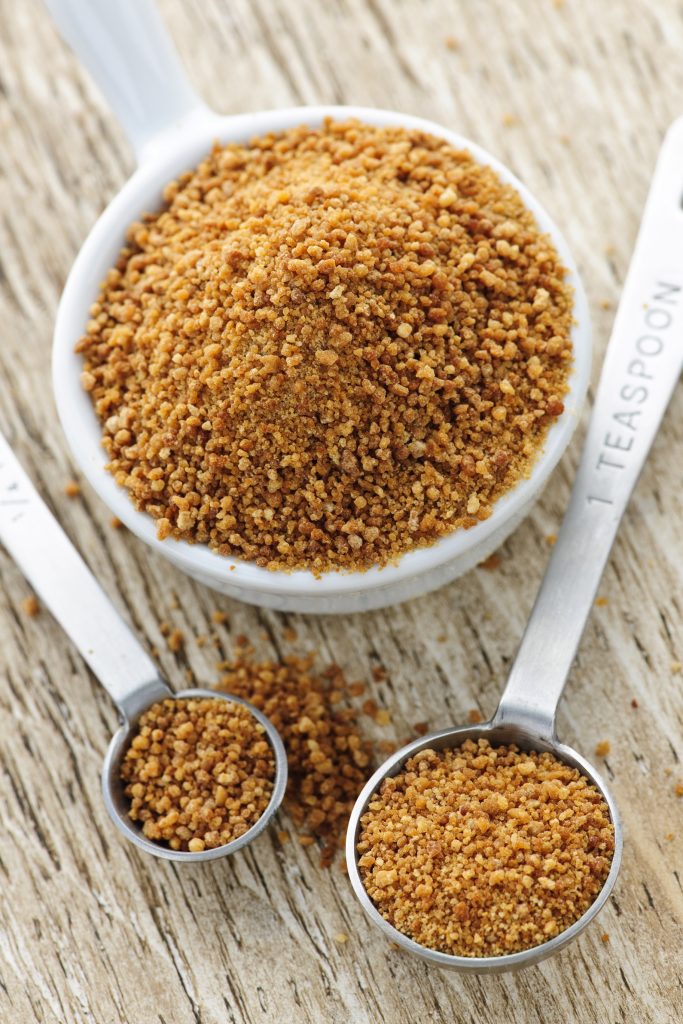
Seems like there is a hot, new “healthy sweetener” on the market every 10 minutes and as soon as you are convinced that this is the ONE, new reports come out saying, “NO, stay away!” Frustrating, I know.
Let's look at the star “healthy sweetener” of the moment, Coconut Palm Sugar. Is it all it's cracked up to be?
What exactly is Coconut Sugar?
Coconut sugar is an unrefined sweetener derived from the nectar of the blossom or bud of the coconut palm tree, not the coconut itself but the bud that would form a coconut. This is important because this bud is the source of all nutrients that are being fed to the maturing coconut, kind of like the umbilical cord from mom to baby. Skilled farmers, called “tappers” tap the bud and release the sap. The sap is then heated and crystallized.
So what is so great about coconut sugar?
From a culinary standpoint, it's delicious. Dark hints of caramel and butterscotch make it truly complex in flavor. I began experimenting with coconut palm sugar a few months ago and I am hooked.
Nutritionally speaking coconut sugar is full of micro-nutrients, which in the sugar world is a very unique characteristic. Naturally high in zinc, iron, magnesium, potassium, B-vitamins and vitamin C. As opposed to white sugar, which is so heavily processed that it has been stripped of all it's nutrients.
Studies have shown that coconut sugar has a Glycemic Index score of 35, which is lower than honey, agave or sugar. The lower the glycemic index score the less it will affect blood sugar levels. However, there are many people that are questioning the efficacy of coconut sugar's GI score. Here is the issue: natural sweeteners vary from batch to batch both in the processing and the materials. Just as each snowflake is unique, each crop of coconut sugar may vary a bit – that's what makes it natural. How much will this GI score vary? I'm not sure, but it's fairly safe to say that each batch should remain in the low zone of under 55.
Coconut Palm Sugar IS sometimes called Palm Sugar.
All coconut sugar can be considered palm sugar, BUT not all palm sugar is coconut sugar. Palm sugar is from the palmyra or sugar palm tree and coconut sugar is from the coconut palm. This is important because Palm sugar can be mixed with cane sugar which will completely change it's nutritional benefits. Super easy way to avoid this nutrition pitfall? Buy coconut palm sugar where the label reads 100% coconut. Easy enough.
You can check out the nutrient density of coconut sugar here
Sugar + Sugar = Sugar
Coconut sugar, agave nectar, palm sugar, white sugar, turbinado sugar, cane sugar… You catch the drift? All forms of sugar. Are some better than others? Definitely. Is any one a miracle sweetener that doesn't really count as “sugar?” Nope. Americans consume on average 150 lbs of sugar per person per year, in a major way this is contributing to the health epidemic in this country. It is best to reduce the amount of sugar you consume. All sugar, period. Switching to a more natural sweetener is a great step in that direction because the high mineral content can actually help to reduce your sweet cravings. The old adage, everything in moderation, holds vitally true here. In order to optimize your health, work to reduce the foods that aren't serving you. So, coconut sugar, yes please, but in moderation, it is still a form of sugar.
Where do I get coconut sugar and How do I use it?
The FUN stuff! I like the brand, Sweet Tree, which can be found at most natural food markets like Whole Foods.
You can substitute coconut sugar for white table sugar at a ratio of 1:1 in any recipe. From a flavor perspective it is a grand improvement. Although studies show that coconut palm sugar has the same sweetness as regular sugar I find you can use much less of it. And isn't this the overall goal? So for recipes that call for 1 cup of sugar, try 3/4 cup of coconut palm, and continue to reduce the amount so your taste buds get accustomed to treats that are less sweet.

















